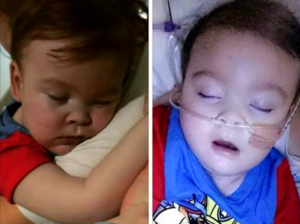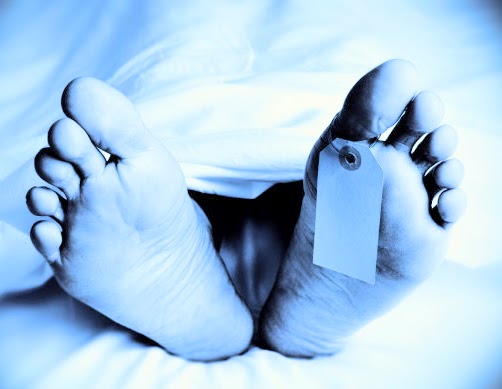 All the powers of the British state are now lined up against the life of little Alfie Evans. Police officers are deployed outside Alder Hey Hospital and uniformed police secure the room in which Alfie lies. In a series of judgements, the courts have pronounced that it is in the best interests of Alfie Evans to die whether or not he is imminently dying and irrespective of alternative offers of free hospital treatment, care and independent medical assessments abroad. Accordingly, “treatment”, which after some highly contentious case law, includes food and fluids, has been withdrawn since 9.17 pm on 23 April 2018 and partially reinstated many hours later. In an attempt to keep Alfie hydrated, Tom Evans, Alfie’s father, has gone so far as to use his own saliva in a continuing, defiant, fatherly kiss of his threatened baby boy.
All the powers of the British state are now lined up against the life of little Alfie Evans. Police officers are deployed outside Alder Hey Hospital and uniformed police secure the room in which Alfie lies. In a series of judgements, the courts have pronounced that it is in the best interests of Alfie Evans to die whether or not he is imminently dying and irrespective of alternative offers of free hospital treatment, care and independent medical assessments abroad. Accordingly, “treatment”, which after some highly contentious case law, includes food and fluids, has been withdrawn since 9.17 pm on 23 April 2018 and partially reinstated many hours later. In an attempt to keep Alfie hydrated, Tom Evans, Alfie’s father, has gone so far as to use his own saliva in a continuing, defiant, fatherly kiss of his threatened baby boy.
In 1999, I warned of the dangerous direction in which English law was headed after the controversial decision in Airedale NHS Trust v Bland. Not only was the doctrine of best interests being applied in novel and irrational ways so that it might be in the best interests of non dying patients to be dehydrated to death, the concept of a “meaningful” life was being used to undermine principles of equal dignity, rights to life, freedom from degrading and inhuman treatment and non-discrimination on grounds of disability. In effect, a judicial and then managerial “quality of life” decision that, for example, a disabled person was living a meaningless life could spell the state sanctioned and institutionally orchestrated end of that person’s life. In addition, the court classified food and fluids as “treatment”, so that one’s supper might regarded as “treatment” to which one was not entitled.
Finally, in a nod to the oft misrepresented principle of double effect, it was held that some removals of treatment would constitute permissible omissions rather than intentional acts bringing about the death of a patient, i.e. murder. Of all the principles, this latter was probably the least problematic because there are often occasions when omissions to treat are not properly classifiable as murder or any kind of homicide when death results. Vitalism, a term identifying the promotion of over-burdensome, futile or over-expensive treatment or the coercive usurpation of autonomy of patients, is no necessary part of the opposition to the reasoning in Bland.
So what are the central legal questions in Evans and how has it got to this? How can a baby who has falsified the ominous prognoses of the medico legal naysayers by breathing for himself for days, be denied food, fluids, care and sensible treatment (like slow weaning off ventilation and artificial nutrition and hydration)? How can the courts remove the right of parents who are neither abusive nor neglectful to take their ailing child to another hospital for treatment?
Liberty and Institutional Power
One of the reasons Evans causes public consternation is because it is really about liberty – not principally the right to life. It involves related questions about parental liberty to access treatments, care, second opinions, and diagnoses at other hospitals available to them. Properly interpreted, these rights are guaranteed under Articles 5 and 8 of the European Convention of Human Rights and Fundamental Freedoms (ECHR). Of course, abusive or neglectful parents are not in the same position. Where parents propose abusive or neglectful behaviour, the liberty and family life principles give way to the decision of the court. In ordinary circumstances, however, the state is in no position to adopt the lifelong care, decision-making and commitment that goes into rearing a child. It is ill equipped to mimic the commitment of families.
Right to life, Degrading and Inhuman Treatment, and Disability Discrimination
The case only becomes a right to life case once the state has triggered its coercive functions to cause the death of a vulnerable patient. And this is where we are now. Alfie is on a variant of the Liverpool Care Pathway (LCP). For those unaware of the history of this national programme, the LCP was exposed as lethally dangerous by Britain’s famous Neuberger Review in 2013. What was demonstrated there was the dangerously self fulfilling nature of programmatic withdrawal of food and water from often non-dying but sedated patients. Even if you weren’t dying before the institution of the Pathway, you certainly were once terminal sedation and removal of food and fluids was instituted. An investigation by British journalists in mid 2012 had exposed the massive spike in numbers of deaths on the notorious Pathway once the medical strategy was financially incentivised in hospitals, hospices and care homes around the UK.
The immediate effect of the Neuberger Review was the cessation of the financial incentivisation of the process. Healthcare professionals were not to be identified as failing members of staff for putting too few patients on what is now grimly referred to as the Death Pathway.The financial incentivisation of the programme, involving the use of gold standards frameworks and tick-box employment incentives to implement what was demonstrably a lethal strategy, was abandoned.
Of course, by then thousands of NHS staff had implemented the procedure, sometimes in entirely proper circumstances, and had invested their commitment to it publicly. Many of these can still be heard on social media defending the Pathway demonstrating no concern for the escalation in numbers of patients dying on that lethal programme after 2008 when it was financially incentivised..
The Liverpool Care Pathway, however, is only the tip of the medico legal problem facing British state healthcare in an age of spiralling healthcare costs. Attitudes to the dignity of patients, the chronically disabled, old or frail, are now in the hands of managers, bureaucrats and medico legal experts who long ago abandoned the idea of equal dignity taking up instead the arbitrary and managerially manipulable concept of the “life worth living” a term remarkably close to the “Lebensunwerten lebens” concept used to spectacular effect in 20th century Germany.
Resistant medical staff having been identified and eliminated, those remaining are all too eager to demonstrate their commitment to the removal of food, water and care from those demonstrating insufficient “quality of life”. These members of Britain’s medico legal establishment – academics, judges, managers and healthcare professionals, are eager to classify disabled, young, elderly or otherwise vulnerable patients as having “no best interests” and “no meaningful life”, “non-persons” in current bioethical parlance, in fact. The institutional spectacle would be comic were it not so homicidal: experts parade their own career enhancing, interpretative daring by outlining their own outlandish principles of what is a “life worth living” just prior to a patient’s being terminally sedated and dehydrated to death.
In David Glass, the family of a non-dying disabled boy were convicted of assault or intervening physically to remove chronically disabled David from a dangerously lethal hospital environment. He went on to live happily with his family for well over a decade after the attempt to withdraw treatment and institute terminal sedation. Ashya King’s family resorted to escaping the UK in order to win the experimental treatment abroad that has seen his massive improvement. The family enjoy happy holidays abroad defying the lethally-directed, quality-of-life prognoses of the clannish British medics. Some have been savaged by the system. The parents of Charlie Gard were never permitted to take their child to the US for treatment even though they had the funds to pay for it and there was no evidence Charlie was in pain. The child had ventilation removed and given terminal sedation and died within a few hours. Such was the culture at one British hospital that Kane Gorny a 23 year old man used his mobile phone to ring police to tell them he was being dehydrated by staff at his hospital. This police complaint took place just prior to his being left in a room without proper fluids to die. His death certificate said he had dehydrated to death.
In fact there are countless examples of families still traumatised by the implementation of the dehydration procedures in circumstances where their loved ones were not dying. The numbers are so great, it is impossible to do the subject justice.
Financial, Political and Medical Interests in Controlling Death
It is always important to recognise the financial, medical, research and political interests there are in ending people’s lives. Clinical trials, gross negligence cover-up, research, body parts, organ harvesting, reduction of healthcare costs, private interests in inheritance and a host of other worldly concerns, both licit and illicit, surround the death of a patient. In this environment, it becomes all the more important to permit patients and those opposing death-dealing initiatives, the freedom to seek alternative treatment and care elsewhere.
Given that there has been no diagnosis and no independent assessment of Alfie before withdrawing ventilation, and now food and fluids,despite the provision of air ambulance, citizenship and free care by the Italian government, suspicions arise as to the motivations at work. There is a viable alternative to treatment and care in the UK. That has been assured by the Foreign Ministry of Italy.
It is time Alfie was fully treated, fed, hydrated, allowed slowly to recover from the trauma of sudden withdrawal of treatment and care, and allowed to leave the hospital. Aside from anything else, like Kane Gorny, dehydrating non-dying patients to death undermines confidence in Britain’s medico-legal system. The spectacle of this non-dying baby boy being deliberately dehydrated to death by a state that has trapped him in an institutionally lethal environment is too much to bear.








Comments